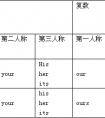改错。1. 这是一本英语书。 This is a English book.2. 这是什么?是书包。 What's this? It's bag. 3. 那个用英语怎么说? What's that English? 4. 这是苹果,那-七年级英语
I can't find my hat. I think I must buy one.(不定)
我找不到我的帽子了。我想我该去买一顶。
The hat you bought is bigger than that I bought.(同类但不同个)
你买的那顶帽子比我买的大。
I can't find my hat. I don' t know where I put it.( 同一物)
我找不到我的帽子。我不知道我把它放在哪了。
1、this和these指在时间或空间上较近的人或者事物,that和those指在时间或空间上较远的人或者事物。例如:
This is a pen and that’s an eraser. 这是一支笔,那是块橡皮擦。
This is a boy and those are girls. 这是个男孩,那些是女孩。
2、指示代词所指的对象取决于说话者和听话者共同熟悉的语境。如:
I liked this movie today better than that concert last night.
我喜欢今天的这个电影,胜过昨晚的那个音乐会。
3、指示代词具有名词和形容词性质,既可指人也可指物。但是在相当于名词时一般指物多于指人。如:
I found this wallet. I found this.
我找到了这只皮夹子。我找到了这个。(this 等于 this wallet)
Is she going to marry that man?
她打算跟那人结婚吗?(that man不得用that代替,否则有轻蔑之意)
4、相当于名词的指示代词在句中作主语时,则指物指人均可。如:
What are these? 那些是什么?(指物)
This is Bill. Is that George? 我是比尔。你是乔治吗?(电话用语)(指人)
5、打电话过程中,介绍自己时通常用this指代“我”,不用代词I;
询问对方时用that指代“你”,不用代词you。例如:
----Hello. This is Mary. Who’s that? 喂,我是玛丽。你是谁?
----This is Tom. 我是汤姆。
6、当指示代词所指的事物已确定时,后面的指示代词则用it或they代替。如:
This (suit) is expensive, isn't it? 这套衣服昂贵,不是吗?
"Are those yours?" "Yes, they are." “那些是你的吗?”“是的,它们是我的。”
|
指代 |
单数 |
复数 |
|
近指 |
this |
these |
|
远指 |
that |
those |
知识拓展:
a. 指示代词所指的事物第二次提到时,通常要用it或they.
例:----What is this? 这是什么?
----It is a bird. 是鸟。 ----Is that your cap? 那是你的帽子吗?
----No, it isn't. 不是。
b. this, that, those和 these加名词构成一些常用短语,作时间状语,指现在或过去。
例:this morning 今天早晨
this spring 今年春天
that morning 那天早晨
that spring 那年春天
these days 这些天
to this day 至今
in these days 这些日子里 this evening 今天晚上
this winter 今年冬天
that evening (/night) 那天晚上
that winter 那年冬天
these years 这些年
this time 这一次(这个时候)
in those years 那些年月里
考点名称:形容词
- 形容词:
简称adj.或a,形容词用来修饰名词或代词,表示人或事物的性质、状态,和特征的程度好坏与否,形容词在句中作定语,表语,宾语补足语。
她是一个好学生,她学习努力。She is a good student, and she works hard.
这辆自行车很贵。This bike is expensive.
对不起,我现在很忙。I am sorry, I'm busy now.
你为这次会议做好准备了吗? Have you got everything ready for the meeting? - 形容词的语法功能:
一、作定语
He is the greatest writer alive.他是依然健在的伟大的作家。
Somewone else has done it.别人已经做了这事。
二、作补语
形容词做主语补足语和宾语补足语时,可以表示其现状、状态,也可以表示某一动作的结果,并常用在表示“认为,看待”的动词如believe,prove,consider等候。例如:
The news made her sad.这消息使他感到非常悲伤。
Don't marry young.不要早婚。
三、作状语
形容词或形容词短语可作状语,形容词作状语时,可以看作是“being+形容词”结构的省略,可表示时间、原因、条件、方式、强调或伴随状况等意义。例如:
Enthusiastic,they are co-operative.热心的时候他们是很合作的。
Rich or poor, young or old, we all have problems.不管是穷人还是富人,不管是年轻人还是老人,我们都有问题。
四、做表语
The ship was adrift on unknown seas.那艘船在陌生的海域漂流。
五、做主语
Old and young joined the discussion.
Rich or poor meant the same to him.作感叹语
Very good!Say it again.
Stupid!He must be crasy. 形容词的几个特殊用法:
most 同形容词连用而不用 the, 表示 " 极,很,非常, 十分"。
It's most dangerous to be here. 在这儿太危险。
I cannot do it, it's most difficult. 我干不了这件事,太难了。
"The+形容词比较级..., the+形容词比较级..." 表示 " 越... 就越..."。
The more you study, the more you know. 你学的越多, 就知道的越多。
The more I have, the more I want. 我越有就越想要有。
The more, the better. 越多越好。
" 形容词比较级 + and + 形容词比较级 ", 表示 " 越来越... "。
It's getting hotter and hotter. 天气越来越热了.
It's pity he is getting poorer and poorer. 真可怜他越来越穷了。
The computer is cheaper and cheaper. 计算机越来越便宜。
The more and more people focus on the meeting next year. 越来越多的人关注明年的会议。
主语+谓语(系动词)+as+形容词原形+as+从句。表示两者对比相同。
This box is as big as mine. 这个盒子和我的一样大。
This coat is as cheap as that one. 这件衣服同那件衣服一样便宜。
I study English as hard as my brother. 我同我兄弟一样学习努力。
the + 形容词 表示某种人。
He always helps the poor. 他经常帮助穷人。
I like to have a talk with the young. 我喜欢同年轻人谈话。
The rich sometimes complain their empty life. 富人有时抱怨他们空虚的生活。
The police led the old man across the street. 警察领老人横过马路。以-ly结尾的形容词
1) 大部分形容词加-ly可构成副词。但 friendly,deadly,lovely,lonely,likely,lively,brotherly,仍为形容词。
改错:(错) She sang lovely. (错) He spoke to me very friendly.
(对) Her singing was lovely. (对) He spoke to me in a very friendly way.
2)有些以-ly 结尾的词既为形容词,也为副词。
daily,weekly,monthly,yearly,early
The Times is a daily paper.
The Times is published daily.too+adj.+to句型 “太…而不能”
He is too young to go to school.
=He isn’t old enough to go to school.
=He is so young that he can’t go to school.形容词的位置:
1.形容词一般放在名词前作定语?
单个形容词修饰名词时,一般要放在名词的前面。它们的前面常常带有冠词、形容词性物主代词、指示代词、数词等。例如:?
a red flower一朵红花?
an interesting story一个有趣的故事?
six blind men 六个盲人?
my own house我自己的房子?
- 最新内容
- 相关内容
- 网友推荐
- 图文推荐
| [家长教育] 孩子为什么会和父母感情疏离? (2019-07-14) |
| [教师分享] 给远方姐姐的一封信 (2018-11-07) |
| [教师分享] 伸缩门 (2018-11-07) |
| [教师分享] 回家乡 (2018-11-07) |
| [教师分享] 是风味也是人间 (2018-11-07) |
| [教师分享] 一句格言的启示 (2018-11-07) |
| [教师分享] 无规矩不成方圆 (2018-11-07) |
| [教师分享] 第十届全国教育名家论坛有感(二) (2018-11-07) |
| [教师分享] 贪玩的小狗 (2018-11-07) |
| [教师分享] 未命名文章 (2018-11-07) |

![— Do you know Meimei? — Yes, she is from a university and she is _____ honest girl. [ ]A. a B. an C. / -九年级英语](http://www.00-edu.com/d/file/ks/4/2/budingguanciaan/2019-11-29/small4247048cc84563d0252c1b027b2033211574983264.png)
![—Did that sportsman win ____ gold medal at ____Athens Olympics?—Yes, he did.[ ]A. a; an B. a; theC. a; / D. /; the-九年级英语](http://www.00-edu.com/d/file/ks/4/2/budingguanciaan/2019-11-29/small06f379c6a3c3ac9bb311d3a899491d161574984708.png)
![We don’t think she is ____ honest girl. [ ]A. a B. an C. the D. /-八年级英语](http://www.00-edu.com/d/file/ks/4/2/budingguanciaan/2019-11-29/small71b0b51d70c69d2813b4c24ce33ea1331574983883.png)
![— Do you have _____ MP3? — NO, I don't.[ ]A. a B. an C. the -九年级英语](http://www.00-edu.com/d/file/ks/4/2/budingguanciaan/2019-11-29/smallb4936ea5ddac8c680b9d3e87837821eb1574983324.jpg)

